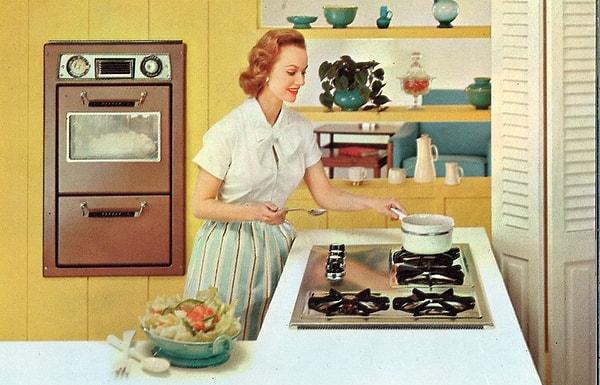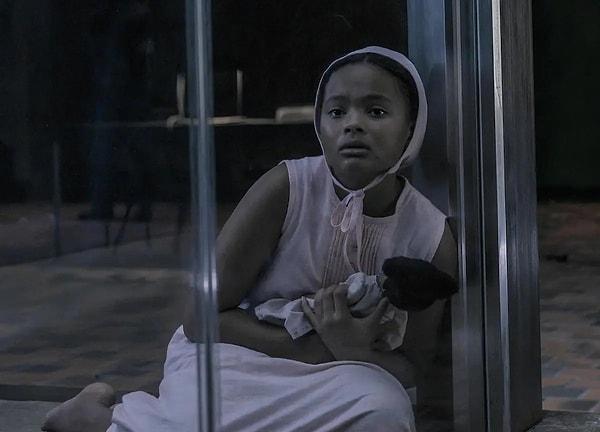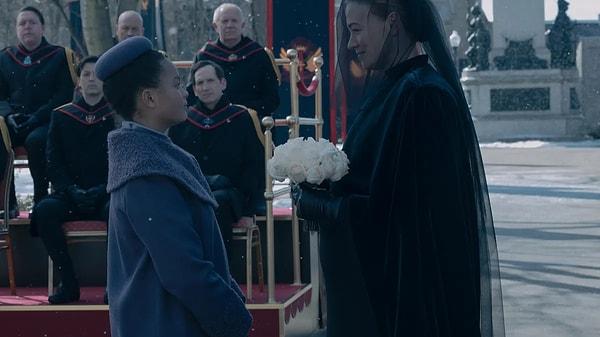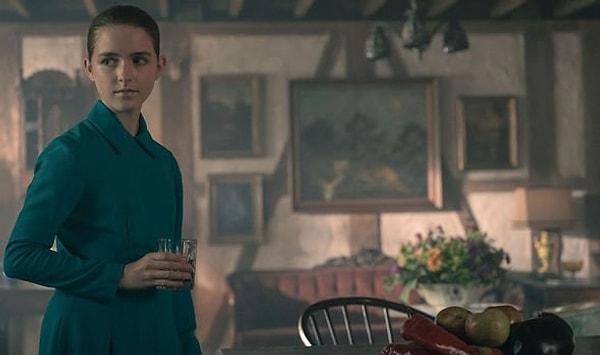The Handmaid's Tale: Wives Have Bad Things Too
Mid-20th century domestic arts was centered around the idea that wifehood was a privilege. Women were housed, fed, and loved, and in return, they ensured that their husbands had everything they needed to live happy, successful lives.
It was a huge responsibility. They were in charge of their husband's nutrition, appearance, and temperament. He would need well-cooked meals at the proper hour, drinks in the sitting room, and a skilled conversationalist--someone who had studied him and understood what he needed to hear.
All of these duties were to be performed with a sense of presentation and poise. Hair, nails, and makeup were all integral to maintaining a healthy marriage. Women didn't want their husbands looking elsewhere.
Many of life's failings could be traced back to a lazy, neglectful housewife. Women were the machine behind the magic. They kept their husbands afloat. Everything they did, from cleaning to ironing, helped maintain a stable home. That was their ultimate goal in life.
There were radicals who believed that women should have the right to live as they saw fit. But that went against everything society believed in. Man was meant to follow God's law, not his own whims, and God said that wives were to submit themselves to their husbands as unto the Lord.

Courtesy of Ian via Flickr
A Return to Traditional Values
In Gilead, wifehood was still considered a privilege, meant only for the daughters of commanders and men of high station. When daughters reached puberty, they were examined by aunts and entered into the running for a suitor, which would be chosen by their parents. While they waited, they were sent to wive's school, where they learned to manage a household.
Unlike their 20th century counterparts, wives were not required to cook or clean, but they did need a basic understanding of those skills in order to judge the quality of their marthas' work. Food was to be fresh and pleasing, made according to a husband's likes and dislikes. Wives were taught how to be economical, stretching their household supplies in times of hardship.
They were also taught how to decorate and create art, like paintings, needlepoint, and knitting. These skills would help them make their house a home--something that mattered a great deal in Gilead. Guests and visitors would judge the household, and by extension the husband and his family, according to certain standards.
This could determine rank, social status, and economic well-being. If you presented yourself well in Gilead and you were well-liked, there were perks. Marthas and handmaids would receive preferential treatment when shopping. The husband would be respected by his peers, and the children would make friends at school.
The wives' behavior was also regulated. There was a sense of quiet deference that permeated daily life. Women were not loud or raucous. There was a way to stand, a way to sit, an appropriate gaze, and a way to speak to others. More often than not, a refusal to conform to those conventions would result in strange looks and shunning. But in some cases, that kind of misbehavior could result in corrections or worse. It was important to act with caution.
None of this was flexible. Radicals didn't have the ability to declare that they were going to get themselves an apartment, use diaphragms, and ignore the patriarchy. Women like that were put away somewhere, never to be heard from again.
Even if they were to somehow manage to shirk the confines of society, women weren't considered capable of taking care of themselves. Their brains were different. They needed a man to help them survive.

Courtesy of Hulu
The Fear of Marriage
In Gilead, girls were taught that they were flowers, precious and beautiful, but that beauty had to be hidden. If a curl fell out of their hair ties, or their skirts went more than two inches above their ankles, men would become ensnared by them and unnatural desires would take hold.
But men were everywhere. They roamed the halls of their schools and patrolled their neighborhoods, carrying giant guns and barking orders. Their faces were often covered, but their eyes weren't, and they always seemed to be searching for a flower to pluck up.
While the adults were cautioning the girls, they went on endlessly about marriage. They said that someday soon, they'd take comfort in their husband's arms, and it would bring them great joy.
That confused them. They processed the danger, not the beauty of marriage. Why should they believe the adults? Wouldn't they have to be alone with their husbands on their wedding night? How would the men control their urges then?
It was like being bred and forced into the lion's pit, and marriage did happen early. Girls were married off as soon as they had their period. That was when they were able to have children, and there was no point in wasting time.
The girls would often feel blindsided. Wifehood was for life, and men were disgusting creatures that wanted to hurt them. Unable to cope with their fate, they'd steal scissors and kitchen knives, cut their wrists, or drink poison--anything they could do to avoid having to marry.
Usually, they would be counseled. The aunts would come and talk to them at the hospital. They'd talk about how wonderful marriage was and try to calm them down. Some did listen, but there were plenty of girls who did not.
They would keep trying until they were either successful at killing themselves or their family had found a way to lock them up until it was time. The other girls in school would notice. Their friends would disappear, and gossip would get around.
There was a palpable terror inside the walls of wive's school. The girls knew that something terrible would happen very soon, and everyone was anxious to get it done.

Courtesy of Hulu
Toxic Sexuality
In general, conservative religious views about sex are extraordinarily toxic. All of the warnings about men and the sins of the flesh can have a lasting effect on young women. They begin to believe that sex is wrong. They'll have trouble getting aroused. They'll feel a sense of unbearable guilt surrounding the act, and in extreme cases, they might develop a phobia.
Phobias are more than just a fear. They come with a full racket of emotional and biological symptoms, and they're extraordinarily resistant to logic. Imagine someone who is afraid of heights sitting at the top of a stadium. They know that they are safe. They'll tell themselves that they are safe. They'll struggle to enjoy themselves and focus on the show, but in their minds they can't stop thinking about what would happen if they leaned forward just a little too much.
Would they topple past the other seats? Would something dampen their fall, or would they keep going and break their neck? It's impossible to move past this type of feeling, not without training or some sort of medication.
Now imagine what would happen to a daughter who just got her first period. Her mother would come into her room, and they'd have a talk about what would happen on her wedding night.
It would sound like a stabbing. The girl would have images of knives piercing her skin, things penetrating their bodies. Her mother would try to reassure her and put her at ease, but that wouldn't work. Phobias don't just go away when you try to calm yourself. Sometimes they result in panic attacks. The girl might start choking on her breath. Maybe she'd be struck with visions and a constant sense of dread.
Nightmares were said to be common.
They were taught that they were flowers, delicate and beautiful and one of those monsters was going to pluck away their petals. It's not difficult to imagine why they were so determined to kill themselves. It was so bad that many of them would have to be drugged on their wedding night.
The audience would see them swaying just a bit, and they'd laugh--just Gilead's version of cold feet. It happened.

Courtesy of Hulu
The Fine Print in the Marriage Contract
As soon as the wives entered their new homes, they were humiliated and violated. Their petals were torn off, and they were forced to learn what it meant to submit to their husbands as unto the Lord.
While there was no indication that this heavy-handed edict was enforced by law, women were heavily brainwashed. They served out of a sense of duty. Their morals and beliefs became their prison, controlling what they did, how they felt, and how they interacted with their husbands.
This meant many things in different households. But in general, the husband's wants and needs came first. When he wanted a specific meal, that's what they ate. If he decided that it was time for bed, it was time to go to bed. If he told his wife to have sex with him, they had sex, whether she wanted to or not.
Since this was a religious edict straight from scripture, true believers would feel guilty if they went against their husband's wishes. They'd repress their own wants and desires in favor of their husband's. They might even do things to hurt themselves if they were told to do so. Gilead's fanaticism had a way overriding basic logic and the survival instinct. It was about obedience, not taking care of oneself.
Wives were imprisoned physically as well as mentally. If they chose to leave, they could be turned into a martha or a handmaid. They could even be forced to undergo a correction or sent to the colonies. In some cases, they were executed.
They were slaves in the modern sense, and they weren't allowed to choose their masters.
Marriages were based on politics. It wasn't uncommon to see 12-year-olds matched with commanders who had spent decades in the system rising in rank. They could easily be 50, 60, or 70 years old, and more often than not, they were pious men who had convinced the public that they were worthy of their rank.
Men like that, who had been raised to believe that sex was wrong, had voracious sexual appetites. They needed to partake of the forbidden fruit as often as they could. They were also ruthless enough to survive Gilead's predatory hierarchy, where power games, blackmailing, and boardroom chess were common.
Men like that tended to subscribe to a more conservative, misogynistic version of Gilead's belief system. They often managed their women with a firm hand, like a pitbull that needed to be toughened up and shown who was boss.
They tended to be hypocritical. The early commanders would frequent Jezebels. Later commanders were more careful, but their libidos were just as strong. They preferred to force themselves on the women at home.
We aren't sure if physical abuse was standard or a part of Gilead law, but there are many instances of abuse in the series. The men certainly had no qualms about hurting their wives, and many of them did believe that women had to be kept on a short leash.
They would likely cane and whip them, perhaps without provocation to dull their rebellious instincts. In all likelihood, they wouldn't face any consequences for this. Commanders were powerful men, and while they were held accountable for many of their crimes, women seemed to have had their rights robbed from them.
A guardian or an eye could be brought into the home if the wife was found sleeping with another man, but we have seen no examples of them rescuing a wife who was beaten or injured. Women were protected against murder, but a man in a powerful position could find ways of covering that up as well.
WIves lived a horrific existence, and for the most part, there was no escape. They simply had to hope that they would outlive their husbands and be placed into a better home. That was their only chance of happiness.
Keşfet ile ziyaret ettiğin tüm kategorileri tek akışta gör!

Send Comment